2016 Christy Awards – Finalists Announced
![ChristyAwardLogo[1]](http://www.speculativefaith.lorehaven.com/wp-content/uploads/2014/04/ChristyAwardLogo1-300x300.jpg) At the end of this month, the Christy Awards, longest running awards for excellence in Christian fiction, will be announced from a group of finalists in nine categories. Recently the award committee announced the finalists. Five speculative novels have been recognized—three in the Visionary category, and two in the Young Adult bracket.
At the end of this month, the Christy Awards, longest running awards for excellence in Christian fiction, will be announced from a group of finalists in nine categories. Recently the award committee announced the finalists. Five speculative novels have been recognized—three in the Visionary category, and two in the Young Adult bracket.
Here are those books, ones you may want to add to your “To Be Read” pile.”
Visionary
- The Five Times I Met Myself by James Rubart (published by Thomas Nelson)
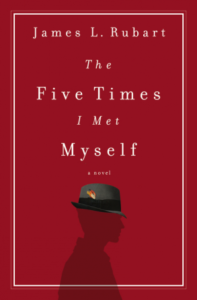
What if you met your twenty-three-year-old self in a dream? What would you say?
Brock Matthews’ once promising life is unraveling. His coffee company. His marriage.
So when he discovers his vivid dreams—where he encounters his younger self—might let him change his past mistakes, he jumps at the chance. The results are astonishing, but also disturbing.
Because getting what Brock wants most in the world will force him to give up the one thing he doesn’t know how to let go . . . and his greatest fear is that it’s already too late.
- A Time To Speak by Nadine Brandis (published by Enclave Publishing) Book Two in the “Out of Time” series.
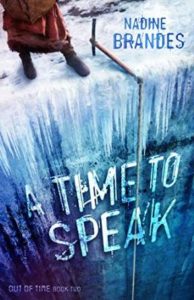
What happens when you live longer than you wanted to?
Parvin Blackwater wanted to die, but now she’s being called to be a leader. The only problem is, no one wants to follow.
The Council uses Jude’s Clock-matching invention to force “new-and-improved” Clocks on the public. Those who can’t afford one are packed into boxcars like cattle and used for the Council’s purposes.
Parvin and Hawke find themselves on a cargo ship of Radicals headed out to sea. What will the Council do to them? And why are people suddenly dying before their Clocks have zeroed-out?
- Waking Beauty by Sarah E. Morin (published by Enclave Publishing)
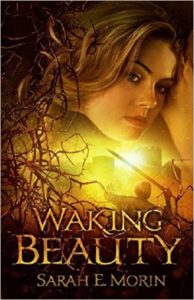 What if the Sleeping Beauty Refused to Wake Up?
What if the Sleeping Beauty Refused to Wake Up?
The rescue wasn’t going at all how he planned. Prince Arpien intends to gain a throne and the sleeping beauty’s heart with a single kiss that wakes her from the evil fairy’s curse. But kissing the princess is only the beginning of a series of unforeseen obstacles: man-eating bugs, deadly spindles, talking lapdogs, and fiery pickles. The sleeping beauty is the biggest complication of all.
Princess Brierly is beautiful and Fairy-Gifted, but also…daft. After one hundred years of sleep imprisonment, Brierly refuses to believe this rescue is anything more than a tantalizing but doomed dream.
Arpien is drawn to the vibrancy be-neath Brierly’s indifferent exterior. Can they reclaim her kingdom? Do they dare trust in the Prince of the old tales to help them battle the evil fairy who cursed Brierly? What is the price of waking beauty?
Young Adult
- The Choosing (A Seer Novel, Book 1) by Rachelle Dekker (published by Tyndale House Publishing)
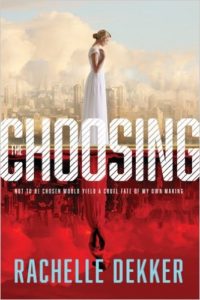
Like all citizens since the Ruining, Carrington Hale knows the importance of this day. But she never expected the moment she’d spent a lifetime preparing for—her Choosing ceremony—to end in disaster. Ripped from her family, she’ll spend her days serving as a Lint, the lowest level of society. She knows it’s her duty to follow the true way of the Authority.
But as Carrington begins this nightmare, rumors of rebellion rattle her beliefs. Though the whispers contradict everything she’s been told, they resonate deep within.
Then Carrington is offered an unprecedented chance at the life she’s always dreamed of, yet she can’t shake the feeling that it may be an illusion. With a killer targeting Lints and corruption threatening the highest levels of the Authority, Carrington must uncover the truth before it destroys her.
- Rebel (No Ordinary Fairy Tale, Book 2) by R. J. Anderson (published by Enclave Publishing)
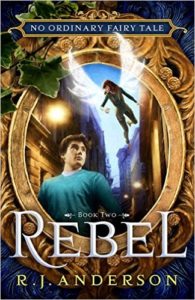
The last time Timothy broke a rule, he got suspended.
But when he defies the faery empress, it might well get him killed.
Timothy Sinclair doesn’t believe in faeries—after all the hardships he’s suffered since his missionary parents sent him away to boarding school, he’s not even sure he still believes in God. But when a tiny winged girl named Linden bursts into his life and begs him to help save her people, the skeptical Timothy finds himself drawn into a struggle against a potent evil that threatens humans and faeries alike.
With a deadly pair of hunters on their trail, Timothy and Linden flee across country, drawn by the legend of a white stone that could be the faeries’ salvation. But the dangers that await them test their courage and resolve to the limit, threatening to tear their unlikely partnership apart. And when it comes down to one last desperate battle, they and all the people they love will be doomed unless Linden and Timothy can find the faith to overcome . . .
– – – – –
One final note about all these Christy finalists: I’m not surprised that two of the three young adult novels fall into the speculative category. I’m pleased, definitely, but not surprised. Speculative fiction is all around in our culture as TV programs, movies, games, and books. Why shouldn’t Christian novels reflect this same interest?
Speculative novels continue to grow in number, and it’s exciting to see them recognized in such a prestigious award as the Christys.
































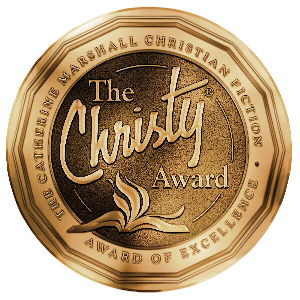

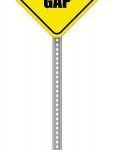





Thanks for sharing, Becky.
Awesome! Definitely got more books to read now…..
Very cool! Congrats, all!!!
Congratulations to the finalists!
If you want to know why Christian fiction is failing, here’s a little tidbit why.
Out of 28 Christy finalists in that list, 27 are women.
Yup, James Rubart is the only male writer in that list. The Christy awards have always been female dominated, but a 4% turnout is embarassingly low even by their standards. If I were a Christian publisher, I’d start seriously worrying about Christian fiction becoming a pink ghetto.
Sorry, David, I don’t buy that. That’s like saying, The reason the US Constitution isn’t doing what the founders set out to do is because ALL of them were men. I’m sorry, but gender doesn’t have to come into play unless you want it to. Are books only good if half of them are written by men? That maskes no sense. Either a book is good or it’s not, regardless of who wrote it.
Becky
I must also disagree. Many of the most popular non-Christian fiction series are also written by women. “Harry Potter,” “Twilight,” and “The Hunger Games” are the most prominent, and are all female-written. Yet they are blockbuster successes.
Perhaps it’s worth asking why this is, or why this is at the Christys. But it’s plainly simplistic to suggest that this means these stories are no good, or that some incidental female-favoring “cabal” selected these stories for reasons apart from their quality. Isn’t such a suggestion also very likely insulting to our sisters in Christ?
Pink… ghetto?
I’m glad Rebecca and Stephen already replied to this because boy, does a comment like that deserve some unpacking. In what other setting* does the heavy predominance of award-nominated female writers even happen, let alone cause such hand-wringing?
(Yet strangely enough, when women writers point out that an awards slate or prestigious roster of speakers is bizarrely male-only in a genre where there ought to be at least some female authors represented, nobody says “Oh no! How embarrassing! Our genre is becoming a blue ghetto!” In fact, their complaints usually get met with scorn, because everybody knows that awards go to the best writers / books regardless of gender, so clearly any female authors who point out the discrepancy must simply be jealous that men are better / more popular writers than they are.)
Anyway, Christian fiction is overwhelmingly dominated by female writers, so it’s no surprise that female authors make up the bulk of the award nominations. It’s also overwhelmingly consumed by female readers, and their money is the same colour as everybody else’s, so I doubt any Christian publishers (who sell plenty of non-fiction books by male authors already) are crying into their coffee cups about that.
* The answer to that is romance novels, obviously, but I don’t see anyone crying unfairness over that.